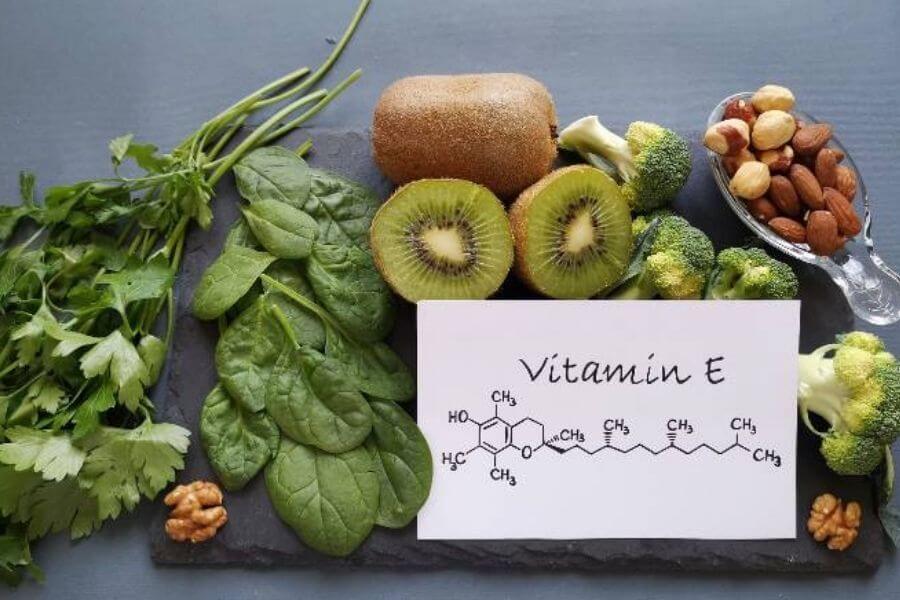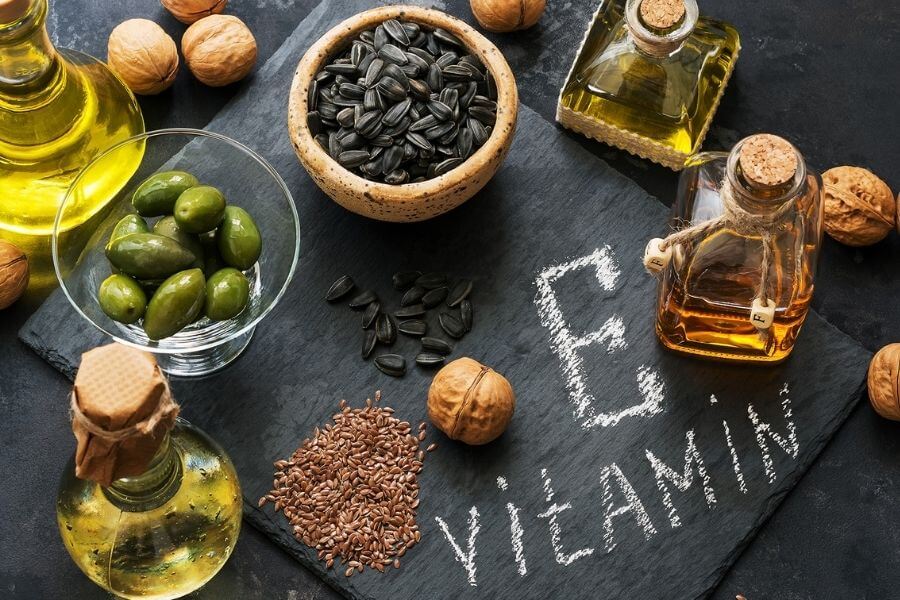Vitamin is an organic molecule essential micronutrient, which an organism needs in small quantities for the proper functioning of metabolism. Vitamins such as vitamin E, vitamin C, vitamin A, vitamin K, etc. are the basic requirements for a healthy body. An organism cannot synthesize essential nutrients, either at all or not in sufficient quantities, and must be obtained through a healthy diet. Vitamin is derived from the word Vitamine in 1912 by Polish biochemist Casimir Funk.
Vitamins are categorized into water-soluble and fat-soluble vitamins. There is a total of 13 vitamins: 4 fat-soluble and 9 water-soluble vitamins. Today, we will read about Vitamin E and its functions, deficiency, and effects on the skin. Let’s proceed further.
What Is Vitamin E?

Vitamin E belongs to the fat-soluble vitamins. Vitamin is a group of 8 fat-soluble compounds that include 4 tocopherols and 4 tocotrienols. Its deficiency, rare and usually due to the underlying problems with digesting dietary fat rather than a diet low in vitamin E, can cause nerve problems. It is a fat-soluble antioxidant protecting cell membrane from reactive oxygen species and also keeps your skin healthy.
Different Functions Of Vitamin E

Many biological functions have been proposed, including a fat-soluble antioxidant. Vitamin E affects gene expression and is an enzyme activity regulator, such as for Protein Kinase C (PKC) – it plays a role in smooth muscle growth. It participates in the deactivation of PKC to inhibit smooth muscle growth, ultimately resulting in good skin texture and shine.
Deficiency Of Vitamin E
Deficiency can cause myopathy, retinopathy, peripheral neuropathy, and impairment of immune responses. Vitamin E deficiency is due to either mal-absorption or metabolic disorder.
The following are the symptoms:
- Difficulty with walking or coordination
- Muscle pain or weakness
- Visual disturbances
- General unwellness
Diet To Correct Deficiency

You can find vitamin E in a wide range of foods. These sources include:
- Nuts and seeds such as almonds, sunflower seeds, peanuts, peanut butter, hazelnuts
- Whole grains
- Vegetable-based oils, especially olive, sunflower, and wheat germ oil.
- Eggs
- Fortified cereals (as now in trend)
- Kiwis
- Mangoes
- Avocados
- Green leafy vegetables such as broccoli, spinach, swiss chard, etc.
- Fishes like salmon, rainbow trout
How Much Do You Need To Consume?
Consuming this vitamin, according to the body needs, varies from person to person. Given below is the daily consumption of the vitamin one must consider.
- Ages from 1 to 3 – 6 mg/day
- Ages from 4 to 8 – 7 mg/day
- Ages from 9 to 13 – 11 mg/day
- Ages from 14 yrs and up – 15 mg/day
- For pregnant ladies – 15 mg/day
- Breastfeeding women should get 19 mg/day
Effects Of Vitamin E On Skin

If you’re looking for natural ways to maintain healthy skin, then vitamin E is the perfect choice to go for. Vitamins are essential to help keep the appearance of skin and its health aspects. The best source is from nutrient-rich foods, but vitamin supplements and topical products containing vitamins can also prove beneficial.
Also, to help skin look its best, it can be used to treat various skin conditions like acne, psoriasis, and the aging effects from sun exposure on your skin.
It is also beneficial at reducing UV damage to the skin. It is also effective at reducing the symptoms of atopic dermatitis and fatty liver diseases and slowing mildly to moderate Alzheimer’s disease. UV light and sun exposure reduce vitamin E levels in the skin. Vitamin E also decreases with age.
Hence, vitamin E is right for your health and keep you disease-free. Its consumption also promotes healthy and glowing skin. Therefore, stop wasting your time and start including it in your diets.
Read Also: Vitamin C: Surprising Benefits, Side Effects, And Precautions







